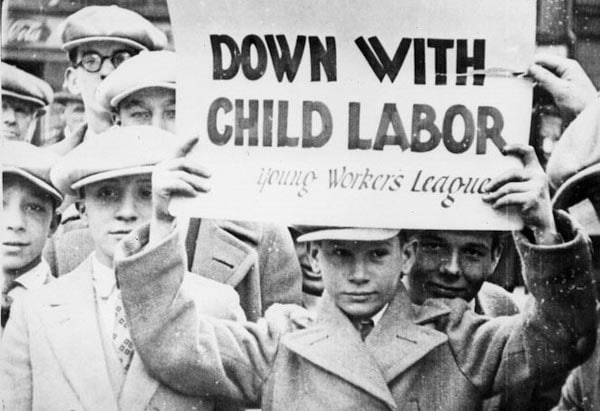The hunt for profits is driving ever more despicable labor laws and practices. A case in point: the sharp rise in the number of states seeking to rollback restrictions on the use of child labor. We need to fight this trend and if we are to succeed we must be clear on who we are fighting. Advocates for the relaxation of child labor protections are not some fringe wackos; they include some of the most powerful rightwing foundations and profitable corporations in the United States.
Legislative trends
The Economic Policy Institute offers the following overview of recent developments:
Already in 2023, eight bills to weaken child labor protections have been introduced in six Midwestern states (Iowa, Minnesota, Missouri, Nebraska, Ohio, and South Dakota) and in Arkansas, where a bill repealing restrictions on work for 14- and 15-year-olds has now been signed into law. One bill introduced in Minnesota would allow 16-and 17-year-olds to work on construction sites. Ten states have introduced, considered, or passed legislation rolling back protections for young workers in just the past two years.
The Iowa bill, which was approved by the state’s Senate in April, gives a sense of where things could be heading nationally. Among other changes, it drops restrictions on dangerous work allowing teens as young as 14 to work in meat coolers and industrial laundries and teens as young as 15 to work on assembly lines. It also authorizes the creation of special permits that would allow teens as young as 14 ½ to drive themselves to work between 5:00 a.m. and 10:00 p.m.
That bill makes the one recently signed into law in Arkansas, which eliminates work permits and age verification for workers younger than 16, seem positively enlightened. But we are only at the beginning of what will likely be a competitive race by state legislatures to deliver the most advantageous legislation for business and it is likely the Iowa bill will exert a strong influence on other state efforts.
Money talks
Supporters of the Arkansas bill argued that they were motivated only by their desire to relieve parents of “obsolete” and “arbitrary burdens” that interfered with their right to decide what was best for their children. And we can expect to hear this argument repeated in other states.
The reason is that the push to gut child labor protections is largely planned and funded by major rightwing foundations and think tanks such as the Foundation for Government Accountability (FGA) and the State Policy Network, as well as business associations such as The National Federation of Independent Business, The Chamber of Commerce, the National Restaurant Association, and the list goes on. These groups, working together, develop the proposals, often tailoring them to specific state conditions, and then offer conservative legislators the arguments and lobbying support needed to win their approval in exchange for future campaign contributions.
Our challenge
According to Department of Labor statistics, there has been a 69 percent increase in the number of minors illegally employed since 2018, including a 37 percent increase over the last year. In 2022, the Department of Labor cited 835 companies for employing more than 3800 children illegally. Of course, these are only the violations caught by onsite inspections; the actual number is certain to be much higher. At the same time, as the bills highlighted above become law many of the same workplace practices will become legal.
The drive to exploit our youth is being driven by the same actors that seek to destroy unions, weaken state regulatory bodies, and defund social services. For example, one of the firms cited in 2022 for violating child labor laws was Packers Sanitation Services, which is owned by the Blackstone Group, the world’s largest private equity firm; it had illegally employed 100 children, many of whom were unaccompanied migrants, in hazardous occupations at meatpacking facilities owned by some of the biggest and most anti-union firms, including Cargill and Tyson.
We need to speak out loudly against this offensive against children, highlighting the political and economic interests driving it. Unions, in particular, have a critical role to play in organizing workplace and community opposition to the unsafe and inappropriate employment of children; it is a matter of defending the wellbeing of their future members.

